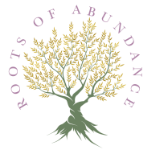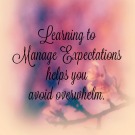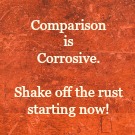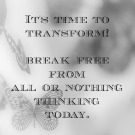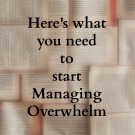Do you often find too many things on your To-Do list? And do you sometimes think, “I have so much to get done. I’ll never get to do all the things I actually want to do.?”
At the core of overwhelm is the inability to prioritize All the Things. This isn’t meant to be defeating or judgmental. It’s meant to show us that in our inability, we have opportunity. And that opportunity is to look more carefully at what we’re really doing with our days, time, and energy.
In essence, we’re plate spinners; All the Things are plates spinning on top of poles, and we rush from one pole to another without believing we can consciously set one or several plates down without a crash. When we accept and celebrate that when we set some plates down, we don’t have to replace them, we’re then left with more time to focus on the activities we love, without the guilt that can often come from doing “less.”
I refer to All the Things in capitals because most of the time, we can do the things we have to, but we can’t find the time to do all the things we want to. John C. Maxwell, a foremost expert on leadership, once said, “We’re doing too many things and the wrong things.” Whoa. Is he right? Are we doing too many things, and are too many of those things the “wrong” things?
If we’re to more mindfully manage our spinning plates, choose which ones to consciously set down, and, more importantly, decide whether or not to replace those plates with others, we need to use three superpowers: choice, responsibility, and focus.
The Power of Choice
A key thing to remember when trying to do All the Things is that we have the incredible power of choice. Yes, we may believe we need to spin all the plates and do everything on our list, but is that really true?
Who we are is what we do. We make time for what is important to us. We invest energy in activities that make us feel good or serve a pressing need. And it’s by looking at where we spend our time and energy that we become clear on what rewards us and how we want to feel.
If we’re constantly checking each notification on our phone, it’s because it rewards us, even if it frustrates us, and we say we’re constantly interrupted. Do we need to check each notification and text? Probably not. Do we need to have conversations and set expectations with those who may be contacting us? Probably.
When we find ourselves frustrated and discouraged because we have too much on our plate
and can’t do the things we love, we must look ourselves in the mirror and face the choices
we’ve made that have brought us to this point.
When you’re struggling with “too muchness,” it can be helpful to remember John C. Maxwell’s quote of, “We’re doing too many things and doing the wrong things.” It can be helpful to ask yourself:
- Is this something I absolutely need to be doing?
- Is this something that only I can do?
- Is this something that needs to be done right now?
- Is this something that aligns with my values?
You always have the power of choice. Use it wisely and watch as non-essential things melt away.
The Power of Responsibility
Another challenge many of us face is taking on that aren’t ours to own. These are situations, duties that don’t truly belong to us, but we get involved with them anyway. This can be harmful because often, we take on the emotions and energies situations that aren’t ours. These emotions and energies go on to drain us in ways we may not always recognize.
Are you a saver? Are you the person who feels as though you need to be doing everything, or be involved in helping everyone out because if you don’t everything will fall to pieces? If so, you’ve probably taken on things that aren’t yours, and you’re afraid of what will happen when and if things fall apart.
Are you someone who continually seeks approval or a “gold-star?” If so, you’ve probably taken on things that aren’t yours, and sometimes this leaves you deflated when you don’t get the recognition you feel you deserve.
If you’re a saver or an approval seeker, there’s a strong chance you’ve not exercised your power of responsibility. You’ve taken on too much, either because you felt you had to or because you weren’t quite able to set boundaries around what is yours and what belongs to others.
To do both the things you love and the things on your to-do list,
you must determine what is your responsibility and what belongs to others.
To help you figure out what does and does not belong to you, ask yourself the following:
- Was I asked to be involved in this situation, or did I volunteer?
- Where am I taking on the emotions of others when it would be better for me to simply listen and let them walk their path?
- How can I set clear boundaries on my mental, physical, and emotional energy?
- How can I practice trusting others to handle their own situations?
- How can I be rewarded mentally, physically, and emotionally by “staying on my side of the street?”
Savers and approval seekers are continuously looking to be valued and can be highly uncomfortable with the messy side of life. They often have very specific ideas about how things “should” be and are afraid that if they don’t get involved, things won’t go “right” (which is to say, things won’t go as they think things should.) By learning what your responsibility is and stepping back from things that aren’t, you can make time for more of the things that bring you joy, while allowing others to do the same.
The Power of Focus
Focus is a powerful tool, but one we may not be using to its best advantage. This is because somewhere along the line, we lost our power to discern what we need to focus on. This is the problem: we can’t function effectively when we believe we need to always multi-task (ie – check every notification on our phone and get three projects done at the same time.) We can’t be present for those we love and get everything done on our list in the time we’ve set for ourselves.
By deciding what we value most and understanding how those values make us feel, we can begin to prioritize what we need to do and in the process, choose what to focus on. This doesn’t mean we only have to do what we want. It means that we start to recognize where we’re spending time and energy on things that are not of value to us and drain us emotionally.
By remembering you always have the power to choose what you do, and determine what is your responsibility, you can focus on what is yours. This helps you set effective boundaries and move toward how you want to feel, all while accomplishing the things that are most important to you.
Your All the Things Plan
Using the power of Choice + Responsibility + Focus, you can start dropping the things you don’t need to be doing (either because they aren’t important or because they aren’t your responsibility) and start doing the things that reward you most.
Because we’re all faced with a mixture of things we need to do (look closely here and make sure you haven’t abdicated your power of choice and / or taken on something that isn’t yours) and things we want to do, it’s important to ask these final three questions:
- How can you eliminate, delegate, relegate, automate, or streamline your to-do list according to your values?
- What plates can you mindfully and purposefully stop spinning? How can you do this without a crash? Please set a timeline to set down ONE plate in the next month and choose how you will reward yourself for doing it.
- How do you want to feel most of the time? How do those feelings spring from your values? Make some notes on the top 10 feelings you’d like to embody and how they can guide you as you use choice + responsibility + focus going forward.
